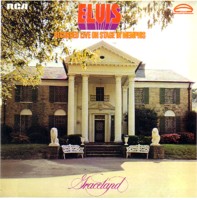The
following article originally appeared in the Salt Lake City
Tribune on January 29th, 1978:
Toxicologists
based at the University of Utah have completed laboratory
studies of autopsy specimens from the body of Elvis Presley
and have found that 11 drugs were present in the singer's
system at the time of his death, The Tribune has learned.
All
of those drugs were consistent with medical treatment, said
the director of the Center for Human Toxicology, Dr. Bryan
S. Finkle. He spoke to The Tribune in an exclusive interview.
The Center had been called in to provide a third toxicological
analysis of typical autopsy specimens from Presley's body.
He
reported, "We have not detected any drug in Elvis that doesn't
have a medical rationale to it - only agents prescribed for
perfectly normal, rational medical reasons."
Dr.
Finkle said the singer had not been drinking prior to his
sudden death, which reportedly was blamed on an erratic heartbeat,
last Aug. 16. Efforts by the Tribune to obtain a copy of the
report by the Center for Human Toxicology have not been successful.
The
Center received the first of the autopsy specimens on Oct.
4, and when The Tribune learned of this Dr. Finkle postponed
requested interviews for professional reasons as he was acting
in a consultant's role and in that, cannot talk in specifics.
He
spoke, when interviewed, in general that, yes, he had been
involved in the case and that he found 11 drugs, all consistent
with medical treatment. Of course, that the entertainer did
have prescription drugs in his system at the time of death
has previously been reported. Most accounts mentioned from
eight to 10 drugs.
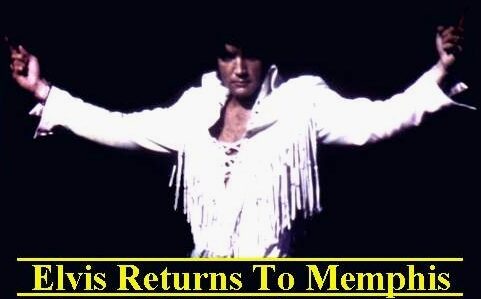
The
Center for Human Toxicology, which has an international reputation
among toxicologists and forensic scientists, was the third
organization called in in this phase of the Presley autopsy.
The others were the Baptist Memorial Hospital in Memphis,
Tenn., and Bio-Science Laboratories, Van Nuys, Calif. Bio-Science
requested the Center of Human Toxicology conduct the third
examination, said Dr. Finkle.
While
certain agencies, including the center based at the University
of Utah, and the Shelby County, Tennessee, Medical Examiner's
Office, involved in this story receive public monies, it appears
unlikely that there will be disclosure of specifics about
the toxicological analysis. The autopsy performed was done
at the request of the Presley family.
In
a nutshell, rights of privacy prevail and the parties appear
to have no legal duty and are not compelled to disclose certain
documents, in particular the toxicological report of the Center
for Human Toxicology.
Dr.
Finkle, as a consultant in the Presley case, said he wrote
a two-page report based on his findings at the request of
Bio-Science. In it he lists the found drugs, their concentrations
and he concludes with an opinion as to the potential or possible
toxicological consequences of having this number of drugs
in these concentrations in a body.
The
laboratory results here apparently satisfied Shelby County
Medical Examiner Dr. Jerry T. Francisco that Presley's death
could not be attributed to drug overdose. However , it was
learned that the death certificate was signed before the final
Finkle report was mailed. Dr. Finkle's opinion was solicited
earlier by a phone call, and Dr. Francisco later said publicly
that the prescriptions drugs found in the singer's system
were not a contributing factor.
The Associated Press, reporting on a press conference Dr.
Francisco called last Oct. 21, quoted the medical examiner
as saying that four drugs were found in significant quantities
in the entertainer's bloodstream.
They
are Ethinamate, Methaqualone, codeine and barbiturates. The
first two are sedatives; codeine is a narcotic analgesic or
milder, secondary pain killer, and barbiturates are "downers" or sedatives or depressants. Dr. Francisco was quoted as saying
that four other drugs-the antihistamine chlorpheniramine,
meperidine, morphine and Valium-were found in what were said
to be insignificant amounts.
Meperidine
and morphine are pain killers and Valium is a tranquilizer.
Presley was not taking morphine per se; the morphine was a
byproduct of the codeine. The AP said Dr. Francisco said the
amount of drugs found in Presley's body, collectively, would
not have constituted a drug overdose. And he said it was unlikely
that the drugs' chemical reactions within the body could have
contributed to his death.
He
said Presley died of a heart disease. "Had these drugs not
been there, he still would have died." Dr. Francisco was quoted
as saying that the press conference. But at this time the
Finkle report was not in hand. It was not completed until
December.
Nonetheless,
the death certificate was signed at a point-just prior to
the release of the Finkle report-where tests were sufficiently
completed so that authorities could conclude that the drugs
did not contribute to the death.

Officially,
Dr. Francisco said in Memphis in October that Presley's death
was caused by hypertensive heart disease with coronary artery
disease as a contributing factor. The autopsy was conducted
by Dr. Eric Muirhead, chief of pathology at Baptist Memorial
Hospital. The autopsy was reportedly most thorough.
While
Dr. Finkle would not be specific, he did give some solid information.
He said that he found no Ritalin in the specimens. Ritalin
is a stimulant and a trade name for preparations of methylphenidate.
Dr. Finkle said he had been specifically asked to look for
this drug among other agents.
As
a toxicologist and not a medical doctor, Dr. Finkle will not
even remotely discuss or determine cause of death. If he has
an opinion he is keeping it to himself.
The
42-year-old- Presley was found face down on the floor of a
bathroom at Graceland, his 18-room mansion, at 2:30 p.m. Aug.
16. He had been last seen alive that day about 6 a.m. after
playing racquet ball with members of his entourage. He was
a sick man. He had hypertension and a colon problem.
Efforts
to revive the singer were abandoned that day at 3:30 p.m.
at Baptist Memorial Hospital.
The
autopsy was reportedly very thorough and careful with several
doctors participating. Dr. Finkle explained that it is routine
in any medical-legal investigation for there to be three facets
to a scene investigation of what were the circumstances surrounding
the death; the medical-legal autopsy, and support investigation
in clinical or toxicological laboratories.
And,
the Presley case was reportedly conducted along routine lines.
When taken to the hospital, there was reportedly suspicion
that Presley died of what might loosely be called a heart
attack; there were signs of cardiac arrest and cardiovascular
blood flow problems. Autopsy specimens were routinely sent
to the laboratory, and it was decided to have two toxicology
labs do the work-the hospital's and Bio-Science. Dr. Finkle
said, "as far as I know" there was no conflict between the
two toxicologists, but there was some medical opinion differences
as to what quantitative amounts of the drugs might mean relative
to Presley's death.
The
physician who conducted the autopsy, Dr. Muirhead, did not
respond to a telephone call and letters from The Tribune.
Shelby County Medical Examiner Dr. Francisco responded that
the autopsy was done at the family request and with family
authorization by the pathology staff of Baptist Memorial Hospital.
This separated him for authorized toxicology studied and he
is unauthorized to release any reports, he said.
"What
he have done," said Dr. Finkle, "is to conduct a routine,
complete series of forensic toxicological analyses on specimens
and determine quantitatively what drugs were present in the
victim and in what breakdown and we were asked what this means:
is it germane to his death, did he die of drugs or didn't
he?" said Dr. Finkle.
Presley's
illnesses included hypertension, some cardiovascular compromise
and a colon obstruction. He fought a losing battle with a
weight problem for several years.
"As
a toxicologist, if you ask me why he had the drugs (in his
system), the answer is that he needed them medically. All
the drugs were in a range consistent with therapy and therapeutic
requirements for known conditions of illnesses which he had," Dr. Finkle said.
The King and Dr. Nick What Really Happened to Elvis and Me (Book Review): Dr. Nick's long awaited memoir was recently released. After three decades of being often maligned by the media and an unforgiving public Elvis' personal physician finally has his say.
In conjunction with interviewing Dr. Nick, EIN's Nigel Patterson spent time exploring Dr. Nick's side of the story.
What EIN found:
- sheds great light on Elvis' medical conditions;
- provides facts around several contentious issues;
- is a memoir written with honest caring and compassion; and
- a memoir which will challenge the views held by many fans!
In order to establish the truth, Dr. Nick deserves to be heard and his memoir is a fitting way for him to clearly state his case. (Source: EIN, Feb 2010)
Read EIN's full review |
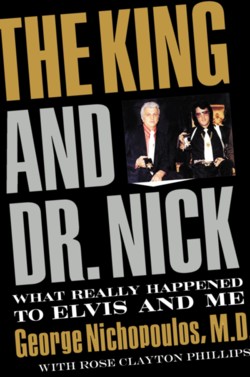 |
| The Death of Elvis Presley? - DNA evidence flawed: In an absorbing major article, EIN today presents the findings of its investigation of the DNA evidence supporting the contention that Elvis did not die in August 1977. EIN's inquiry, undertaken with the assistance of a professional investigation company, exposes the flaw in the DNA claims, provides a timeline of the "Is Elvis Alive?" conspiracy story, and looks at various other strands to the conspiracy theory. ( Conspiracy, Source: EIN) |
 |
| Dr. Nick - Medically Irresponsible or Misunderstood?: EIN has always thought Dr. Nick receives an unfair rap!
So we thought it was time to present a range of information about him, hopefully allowing readers to, in the clear light of day, freshly reflect on each side of the story and determine a reasonable and balanced consideration of Dr. Nick's role and intentions in the complex, and often easily biased, Elvis story! (Source: EIN, 5 June 2009) |
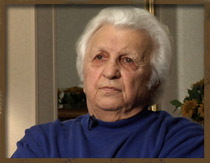 |
"The Elvis Cover-Up" - Geraldo Rivera 20/20 documentaries: EIN recently obtained a copy of the unofficial DVD release of the "20/20" investigations into Elvis' death. Based on a "leaked" copy of the toxicology report on drugs in Elvis' body when he died, and the book, "The Death of Elvis What Really Happened" by Thompson & Cole, the original hour long special (September 1979) plus several follow-up stories are enlightening 'tabloid' viewing.
Rivera exposes the role of Dr Jerry Francisco in going public with a cause of death (cardiac arrythmia) at odds with the official autopsy findings (polypharmacy). The 20/20 investigations were instrumental in leading to the indictment of "Dr Nick". Also featuring a lucid Ginger Alden, the DVD is compelling viewing.
In a follow-up to the most controversial article EIN has ever pubished (the Beeny DNA evidence), EIN examines the iconic Rivera reports. (Source: EIN, September 2006) |
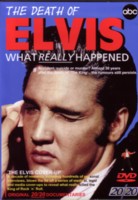 |
The grieving that follows the death of a famous musician is universal, yet also personal.
The funeral for the famous musician stopped the city. Thousands of people packed the streets, sharing their grief and love for the man who was gone. They followed the casket, which was festooned with flowers, and then, together, started singing one of the musician's most popular songs. Never before had so many voices joined in glorious harmony.
When did this happen?
Forever Elvis - A commemorative Spotlight: |
 |
Elvis at 75: Can we ever again see the performer, not the punch line?; One of the best articles EIN has read about "Elvis at '75".
From Mark Feeney of The Boston Globe.
Begin with two facts.
First, he was once beautiful, astonishingly beautiful, and that fact contributed so much both to the rapidity of his rise and the awfulness of his decline. Beauty was almost as important to his success as race was. Same voice, same talent, same songs sung by a white Fats Domino? The impact would have been nothing like what it was. Music created and drove the phenomenon that was Elvis, but it was only part of what made that phenomenon so overwhelming.....
Continue here to the full article & images.
(Spotlight, Source;Feeney/EIN) |
 |
| The death of an icon: On the 29th anniversary of Elvis' passing, American Heritage looks back at the events on August 16, 1977. (Source: American Heritage, August 2006) |
 |
EIN Website content © Copyright the Elvis Information Network.
Elvis Presley, Elvis and Graceland are trademarks of Elvis Presley Enterprises.
The Elvis Information Network has been running since 1986 and is an EPE officially recognised Elvis fan club.
|



